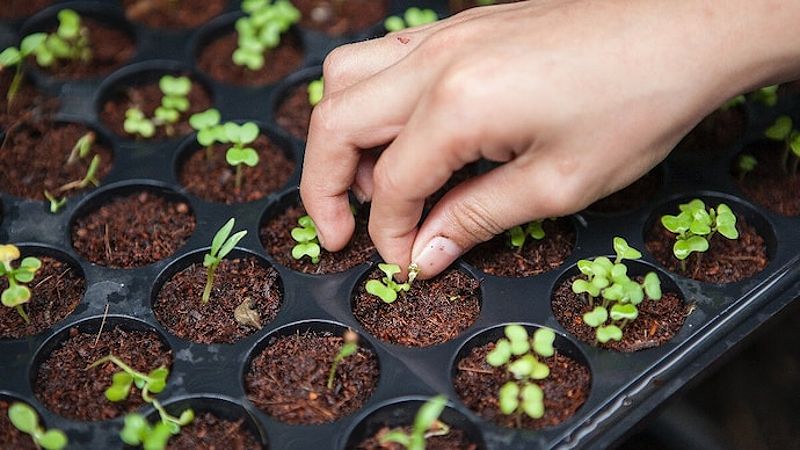Explore the key aspects and benefits of organic farming, a sustainable and environmentally friendly approach to agriculture that emphasizes natural methods and practices. Discover how entrepreneurial students can seize the opportunities in the growing organic food market.
The Benefits of Organic Farming: Promoting Sustainable Agriculture
Organic farming is a sustainable and environmentally friendly approach to agriculture that emphasizes natural methods and practices. It offers numerous benefits for both the environment and human health. By understanding the key aspects and following the basic steps of organic farming, individuals can contribute to the organic food market and promote sustainable agriculture.

( Credit to: Indiatoday )
One of the primary benefits of organic farming is its focus on soil health. Organic farmers employ practices such as composting, crop rotation, and sustainable techniques to maintain and improve the nutrient levels in the soil. This not only enhances the quality of the crops but also promotes the long-term fertility of the land.
In addition, organic farming prioritizes natural pest and disease control. Instead of relying on synthetic chemicals, organic farmers use methods such as releasing beneficial insects, using physical barriers, and planting pest-resistant crop varieties. This not only reduces the environmental impact but also ensures that the food produced is free from harmful residues.
Crop diversity is another key aspect of organic farming. By practicing crop rotation and intercropping, organic farmers create a natural barrier against pests and diseases. This reduces the reliance on chemical pesticides and fosters a more resilient and sustainable agricultural system.
Furthermore, organic farming often integrates livestock, with animals providing manure for natural fertilization and pest control. This holistic approach not only reduces waste but also enhances the overall sustainability of the farm.
The Process of Organic Farming: Nurturing Soil and Cultivating Crops
The process of organic farming involves several basic steps that are crucial for success. It all begins with nurturing and preparing the soil using natural techniques such as crop rotation, composting, and the use of green manure. These practices help maintain soil fertility and improve its structure, ensuring optimal conditions for plant growth.
Crop rotation plays a vital role in organic farming as it helps break pest and disease cycles while replenishing soil nutrients. By alternating different crops in a specific sequence, organic farmers can naturally control pests and diseases, reduce the need for chemical interventions, and promote a balanced ecosystem.
Composting is another essential practice in organic farming. It involves the decomposition of organic materials such as kitchen waste, crop residues, and animal manure to create nutrient-rich compost. This compost is then used to enrich the soil, providing essential nutrients for plant growth without relying on synthetic fertilizers.
Organic farmers also prioritize natural pest control methods. Instead of using chemical pesticides, they rely on beneficial insects, physical barriers, and pest-resistant crop varieties to manage pests and diseases. This approach not only protects the environment but also ensures the production of safe and healthy food.
Water management is another crucial aspect of organic farming. Practices like drip irrigation and rainwater harvesting are employed to conserve water resources and minimize water wastage. By using water efficiently, organic farmers contribute to the overall sustainability of their operations.
Harvesting and storage of organic crops are done at the peak of ripeness to ensure maximum flavor and nutritional value. Proper techniques are employed to prevent spoilage and maintain quality throughout the post-harvest process. This attention to detail ensures that consumers receive the best possible organic products.
Seizing Opportunities in the Organic Farming Industry: Entrepreneurial Students Making a Difference
The growing demand for organic food presents a significant opportunity for entrepreneurial students to venture into the organic farming field and make a positive impact. By pursuing higher education in organic farming, students can acquire the knowledge and skills needed to implement best practices and ensure scalable growth.
With the expected growth of the organic food market, entrepreneurial students can contribute to the health of the environment and meet the increasing demand for organic products. By following the principles and practices of organic farming, they can establish successful businesses that promote sustainable agriculture and provide consumers with high-quality organic food.
Moreover, entrepreneurial students can leverage their knowledge and skills to educate others about the benefits of organic farming. They can become advocates for sustainable agriculture, raising awareness and inspiring more individuals to support organic food production.
By seizing the opportunities presented by the organic farming industry, entrepreneurial students can play a crucial role in shaping the future of agriculture. Their passion, combined with their understanding of organic farming practices, can drive innovation and contribute to a more sustainable and environmentally friendly food system.
Conclusion: Embracing Organic Farming for a Sustainable Future
Organic farming is not just a trend; it is a necessary shift towards a more sustainable and environmentally friendly approach to agriculture. By prioritizing soil health, natural pest control, crop diversity, and holistic practices, organic farmers contribute to the health of the environment and the well-being of consumers.
Entrepreneurial students have a unique opportunity to make a difference in the organic farming industry. By acquiring the knowledge and skills needed to implement best practices, they can establish successful businesses that meet the growing demand for organic products while promoting sustainable agriculture.
As the organic food market continues to expand, it is essential for individuals to embrace organic farming and support its principles. By doing so, we can create a more sustainable future, protect our environment, and ensure a healthier food system for generations to come.
